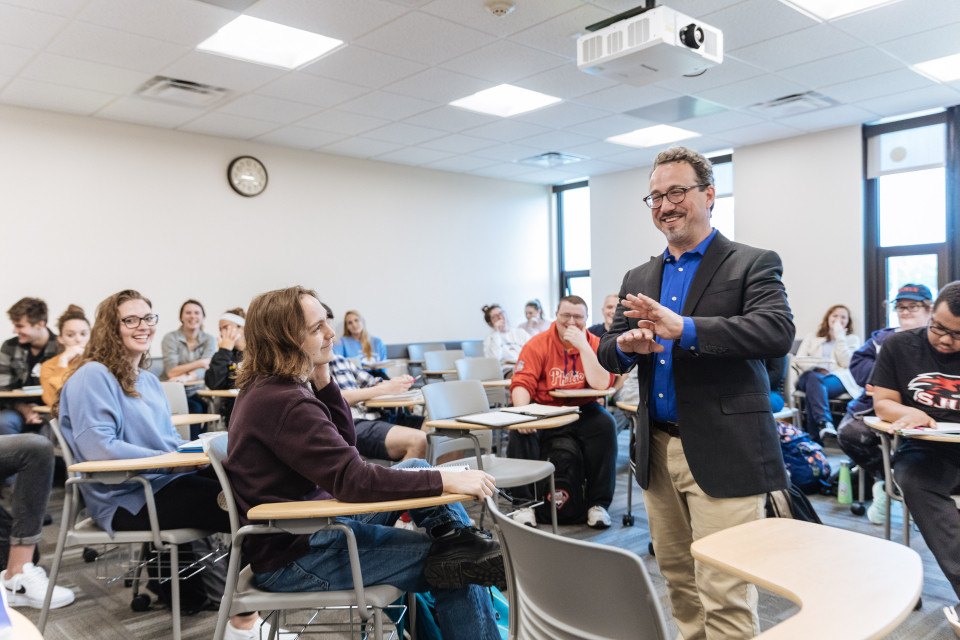Why Gen Z’s College Experience Is Unlike Any Other

Courtesy of Saint Joseph’s University
The “ivory tower” or “college bubble” has long been a phenomenon that many in academia have recognized and expressed concern about. College students, whether busy with coursework and extracurriculars or simply lacking the motivation, were failing to get out into, and learn about, the real world.
And the generation in college now, Gen Z, is experiencing a shift in thinking about what college “should be.” Gen Z has come to be known as anyone born after 1997. These are kids in their adolescent years — or slightly older — who have only known a world in which the Internet existed.
Gen Z includes about 72 million Americans, and they are typically open-minded in their politics. They’re expected to have a massive impact on the world as they come of age and assume leadership positions, which is why they seek out hands-on learning experience in their educational pursuits.
That doesn’t mean clever campus reconfigurations or complicated social engineering. Gen Z wants to learn by doing, rather than studying through the classroom-based approach of older generations. Research shows that they’re more collaborative, and they’re also more professionally focused when they begin their career.
Rather than solely relaying concepts through lectures and readings, professors have discovered that to engage Gen Z students, real-world experience has to be a regular part of their coursework. This active method of learning — long advocated by pedagogical experts — has been embraced by Gen Z.
Saint Joseph’s University in Philadelphia, through its Jesuit tradition and student-focused culture, has long fostered a learning-by-doing approach.
“It’s part of our DNA,” says James Caccamo, Ph.D., Associate Professor and Associate Dean for Students and Experiential Learning, pointing to the Jesuit view of education as always focused on the whole person and always having a real-world goal in mind. “It’s never been a classic Ivory Tower approach. You help people understand the world in all its complexity and that’s going to make society better as a whole.”
To find out just what the modern, worldly college experience is for Gen Z, we took an inside look at the fundamentals at Saint Joseph’s University — co-ops, internships, service learning and research — that impact the entire student body.
Embracing the Co-Op
Saint Joseph’s Haub School of Business has long focused on real-world applicability. Its 18-year old co-op program continues to grow in popularity and in innovation, where students work for a year in the field they hope to enter. Following an accelerated model, students complete their co-op experiences while still graduating in four years with their undergraduate degree.
Current food marketing senior Alison Saile, for example, has racked up co-ops with Kellogg’s and Dietz & Watson through Saint Joseph’s Academy of Food Marketing. At Kellogg’s, she gained experience tracking how sales were affected by COVID-19 and helped design store product displays.
Real-world experience isn’t just important to business majors — it’s valued by students in every discipline. As a result, the University added the co-op model to their College of Arts and Sciences and expanded internship options and field placements for students in all three of the University’s schools. On top of a liberal arts education, students are taught practical skills and applications.
Other Saint Joseph’ students have worked at FOX 29, AmeriSourceBergen and Johnson & Johnson, where, for many of them, the substantiveness of a co-op was still rewarding even in a virtual environment.
For example, Fernando Cordova from the Class of 2023 used his co-op experience as a pricing analyst at AmeriSourceBergen as a way to get to know his coworkers via virtual Friday meetings. And though his co-op was virtual, he was able to develop lasting relationships and contacts as he pursues his degree in finance.
Samantha Kovacs, who worked at Johnson & Johnson reviewing data entry codes and contributing to month-end closing reports, had a similar experience. Kovacs, an accounting and finance major, made a point to get to know her co-workers and network virtually in unique circumstances.
Throughout these experiences, while students operate as employees of the organization, the school still monitors their experience. That means check-ins for both the student and the employer on how the experience is going.
“Students are looking to apply their education in practical ways, so that when they are ready to take the next step, get a job or go to grad school, they have experience,” says Kim Allen-Stuck, Ph.D., Assistant Vice President, Student Success and Educational Support.
It’s also beneficial from an employer perspective — something the career-oriented Gen Z values highly.
“We’ve been hearing in the field of higher education that employers like working with students for a prolonged period of time,” Allen-Stuck says. “That’s so much more indicative of how successful that person could be than just a job interview.”
Internships and Professional Experiences On Campus
The traditional internship model has also evolved to meet the expectations of Gen Z. In the past, students picked a company or organization, and were sent off to receive professional experience. At Saint Joseph’s, students integrate that professional experience into their college education through courses paired with their internship. Credits from these courses can then be applied towards their degree.
Students bring their internship experiences back with them to a shared class in the general field of, say, marketing. The professor will lecture on marketing theory and then open up discussion on how the theory aligns with what students are seeing in their internships. As such, the learning students do outside of the classroom merges with the lesson plans and lectures that they receive inside the classroom.
For example, Chris Blewitt, a member of the Class of 2018 and a former student-athlete on Saint Joseph’s lacrosse team, was able to turn his internship with Mizuho Securities into a full-time job. His internship led to a role in the company’s Debt Capital markets group. Using the skills he learned, Blewitt was able to pursue further opportunities, accepting a subsequent position as a Marketplace Analyst for Forge Global in San Francisco a year later.
Elsewhere, Alyssa Bainbridge, a Class of 2021 graduate, the opportunity to intern at FOX 29 — and interview public figures in Allentown — proved extremely valuable. Bainbridge was able to build her own demo reel and attain real-world reporting experience throughout her internship.
Placing Service Learning First
Just like their older siblings, the Millennials, members of Gen Z are often motivated by following paths that lead to high impact. But combine that with a focus on career opportunities, and you get students who are more interested in merging their burgeoning professional interests with activism than ever before.
Thanks to Saint Joseph’s Jesuit tradition, which puts equal weight on reflection and action, service learning has always been popular at the University. Each semester, many Saint Joseph’s students opt to take courses that have community outreach woven into the syllabus.
“One of the big efforts we have is in Saint Joseph’s communications department, where each student works with a community or nonprofit organization,” Caaccamo says. “For example, they apply their skills at an organization that may not have the money to employ a full-time social media person, and they help them develop social media strategy and marketing plans, to take organizations forward in their digital and promotional presence.”
Students have worked with both local and international organizations, traveling as far as South America and Africa. Rachel Ledbetter, a recent alumna, traveled to Ghana to study human trafficking. While there, she promoted awareness of the problem by creating documentary films and writing blogs. It’s an important experience for her future career: She’s hoping to eventually work in foreign health aid. With Gen Z, it’s about giving back, while simultaneously pursuing their passion for a lasting career in their profession.
At Saint Joseph’s, that need is being fulfilled through conscious design. Courses are offered to run alongside the service activities for many programs. That way, students have an opportunity to discuss, process and place the work that they’re doing into a larger context to gain a lasting understanding of the issues at play.
“They might be taking a philosophy class,” Allen-Stuck says. “And they’re talking in class about what they’re seeing when they’re, say, helping out a women’s homeless shelter and integrating it into the social theory they’re reading.”
The relationship doesn’t end when the class is over. Saint Joseph’s University encourages students to develop at least a year-long relationship with their chosen organization, as professors from multiple classes work to coordinate and integrate their studies with a given service. This creates a deeper relationship than a simple class exercise.
“That way you’re not just going to a charity for three months, then never going back,” Allen-Stuck says. “It gives students a deep appreciation for the work of the organization.”
Leading and Directing Research as an Undergraduate
Gaining a research grant has always been a big step forward in a student’s undergraduate academic career — and these opportunities can be rare. But for Gen Z, placing a limit on real-world applicability is no longer acceptable.
Just as SJU knows co-ops are no longer just for business majors, the University prioritizes offering research opportunities beyond students in the sciences. Their Summer Scholars program offers students upwards of $2,000 plus room and board over the summer to pursue their preferred research area with the support of a faculty member. Projects have ranged from medical and chemical research projects to writing original plays, researching the nature of conspiracy theories in society and even charitably securing and distributing books to local schools.
These project designs reflect Gen Z’s focus on engaging with the issues of today. An English major recently took on the school-to-prison pipeline, tutoring disadvantaged students while analyzing the results in a larger systemic context. Another student looked at the potential impact of technology on learning for neurodiverse students.
The Summer Scholars program is designed to create a network of burgeoning academics and researchers who bond with each other as they pursue their studies.
“We create this environment on campus where all the summer scholars have an intellectual community for them during the summer,” Allen-Stuck says. “It’s something we’re really proud of.”
Overall, the program represents a new frontier of a more interactive college experience connected to the real world. Gen Z students challenge and support each other as they go out into professional environments. When they return, they gain the full academic context, as research projects and service learning thoroughly blend the two.
And while the older members of Gen Z are only just now entering the workforce, one thing is for sure: They’re more prepared than their parents and older siblings to engage with the world. And the world, in turn, can only be better for it.
“From the very beginning at Saint Joseph’s, students are engaged in thinking about how they have a responsibility, whoever they are, whatever field they go into, to make the world a better place,” Caccamo says. “It’s been what we’ve been about in Jesuit education from the very beginning, and it drives our students.”
This is a paid partnership between Saint Joseph's University and Philadelphia Magazine


